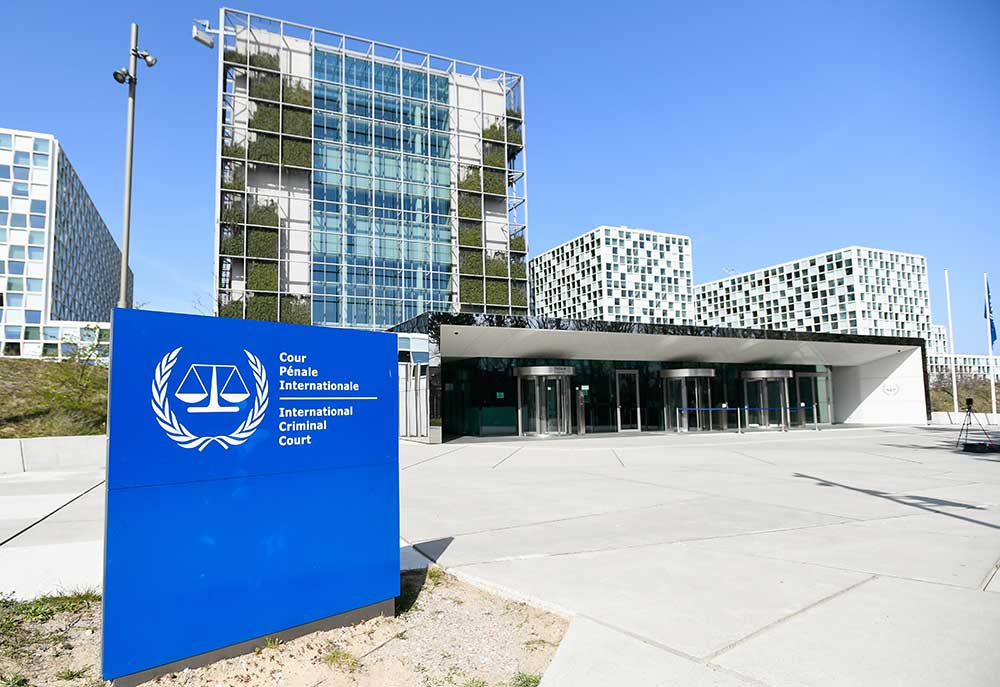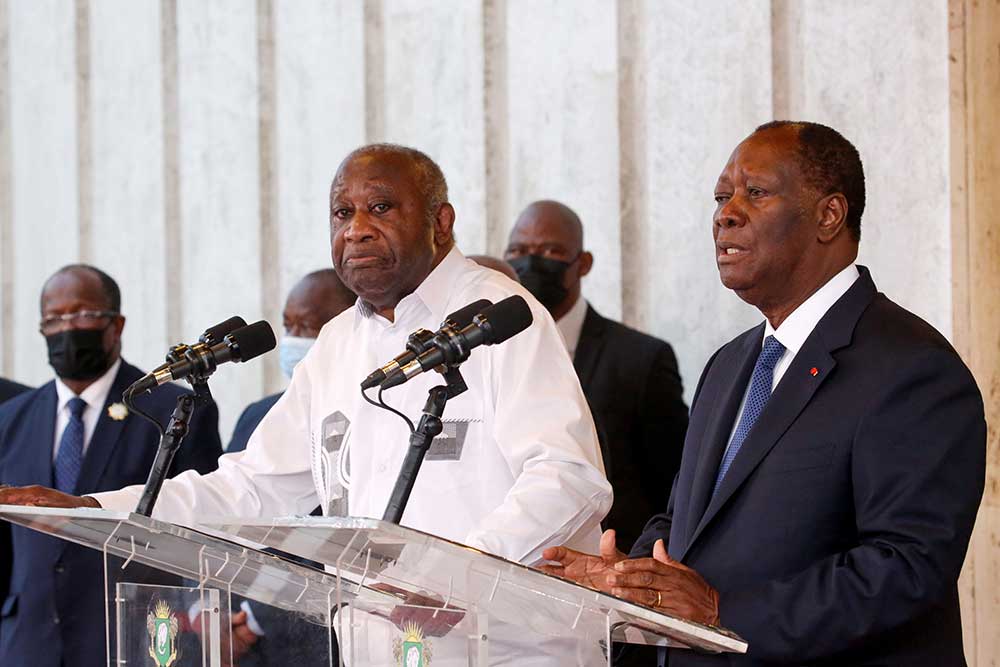The 20th-century American conservative Barry Goldwater famously declared that “moderation in pursuit of justice is no virtue.” He might have been wrong, judging by what happened in Cote d’Ivoire after the International Criminal Court arrested former President Laurent Gbagbo in 2011: The country experienced nine years of low-intensity political violence that abated only when Gbagbo was allowed to return this year. The ICC’s inability to prosecute incumbent governments often makes it look partisan, and in Cote d’Ivoire, its blind pursuit of justice undermined reconciliation efforts, Jessica Moody argues in this analysis.
Exiled leaders who have been accused of crimes against humanity aren’t typically met with shrieks of delight when they return to their home countries. But this was the warm welcome that Laurent Gbagbo, Cote d’Ivoire’s former president, received when thousands of his supporters gathered at the airport in Abidjan to celebrate his arrival in June.
During Gbagbo’s 11 years in power, Cote d’Ivoire was engulfed in a nine-year civil war that left at least 3,000 people dead. The conflict produced an electoral crisis in 2010: Current President Alassane Ouattara was declared the winner, but Gbagbo refused to accept his victory. After clashes erupted between supporters of both parties, and United Nations, French, and rebel forces helped Ouattara into power, Gbagbo was arrested and charged with four crimes against humanity at the International Criminal Court (ICC): murder, rape, attempted murder, and persecution.
The ICC ultimately failed to convict Gbagbo, a move that should have damaged Cote d’Ivoire’s prospects for peace. But months later, the opposite has proved to be true. After his release and return to the country, chances of reconciliation appear to be better than ever.

Gbagbo’s curious case highlights the need to question the extent to which the ICC can facilitate peace in post-conflict countries. The international system’s determination to hold supposedly culpable leaders accountable can, as this situation demonstrates, actually impede the peace process. As the ICC continues to pursue justice around the world, Cote d’Ivoire can serve as a lesson regarding the futility of seeking justice for the sake of it – and the need to understand post-conflict political dynamics better before blindly seeking prosecution.
Since Gbagbo’s unceremonious dispatch to The Hague in 2011, tensions have been high in Cote d’Ivoire. Although there has been no outright warfare, political grievances have fueled nine years of small-scale violence. Many of these divisions came to a head in the runup to the October 2020 election, when Ouattara announced he would seek an unconstitutional third term. As supporters of opposition candidates, some affiliated with Gbagbo, clashed with Ouattara’s followers, at least 55 people were killed, and almost all the opposition parties decided to boycott the election.
Gbagbo’s acquittal and return to Cote d’Ivoire, ironically, was the catalyst that finally set the reconciliation process in motion. In contrast to the country’s deadly presidential elections last year, its legislative elections this March were relatively peaceful. Parties affiliated with Gbagbo ended their longstanding boycotts, and, for the first time in over 10 years, almost all the country’s opposition groups participated.
Prosecution backfires?
With Gbagbo’s return to Cote d’Ivoire, signs of peace are finally emerging. In July, he and Ouattara met amicably for the first time in over a decade and agreed to put their fraught past behind them. Henri Konan Bédié, another prominent opposition leader who had a tense relationship with Ouattara, has increasingly called for an inclusive national dialogue and held several meetings with him.
Ouattara, for his part, allowed the return of several other exiled pro-Gbagbo supporters, ordered the release of 78 political prisoners, and finally began to prosecute his own supporters for war crimes, one of the opposition’s longstanding concerns. These are baby steps in a country where cordial political relationships can quickly sour, but they do signify the start of a new chapter.
The ICC claims it prevents crimes from becoming cyclical and helps foster lasting peace – but the opposite appears to be true in the case of Cote d’Ivoire. For nearly a decade, domestic turmoil over Gbagbo’s charges has been one of the key obstacles to political reconciliation. In fact, it is only since Gbagbo’s acquittal that formerly warring factions have begun repairing relations.
The fact that Cote d’Ivoire has come the closest it ever has to reconciliation only after the ICC failed to convict Gbagbo is not exactly a ringing endorsement of the institution. It raises an uncomfortable question: Would Cote d’Ivoire be better off had the ICC not intervened and attempted to hold Gbagbo accountable?
Questions like these have plagued the ICC for years. On countless occasions, civilians and peacebuilders in war-crime-afflicted countries have questioned the court’s ability to facilitate the peace process. In 2005, for instance, the ICC’s decision to issue an arrest warrant for the guerrilla leader Joseph Kony impeded efforts to establish a peace agreement between the Ugandan government and Kony’s Lord’s Resistance Army – especially after he refused to make a deal while the warrant was in place.
Incumbents’ impunity?
In many cases, the ICC’s pattern of inconsistently pursuing cases has also made it seem like a partisan institution among post-conflict communities, a perception that politicizes justice and diminishes prospects for long-term peace.
In Uganda, the ICC’s arrest warrant for Kony was widely seen as a political move, because it focused solely on the Lord’s Resistance Army’s crimes while seemingly ignoring the Ugandan army’s military abuses. In fact, the ICC appeared to target the guerrilla group because the court didn’t have the power to scrutinize the Ugandan government.
Since the ICC lacks its own police force – and therefore the ability to conduct investigations without state cooperation – it tends to focus on charging the adversaries of states. In situations where the court has tried to indict government figures, as it did with former Sudanese President Omar al-Bashir, it struggles to make any progress, because it can’t arrest them. Even though the ICC issued an arrest warrant for Bashir in 2009, it was only able to make headway after Sudan’s 2018 revolution, when the new government adopted a different approach to justice. This August, Sudan finally agreed to hand al-Bashir over to the ICC. To the public, this dependence on state support casts doubt on the court’s impartiality – and hampers its ability to promote peace.
The same issues were exhibited in Cote d’Ivoire. While there was a widespread belief that Gbagbo had committed serious crimes, there were also indications that Ouattara’s followers had been involved in similar abuses.

Yet the ICC, again reliant on state support, only pursued the case against Gbagbo and his supporters. To this day, Ouattara’s supporters still have not been prosecuted by the ICC, despite its repeated pledges to pursue equitable justice in Cote d’Ivoire. Such failures undermine the court’s legitimacy and its ability to foster reconciliation.
This is not to say that the ICC is completely ineffective. Beyond facilitating lasting peace, it is also charged with deterring and preventing crimes against humanity, and thereby shapes international norms about what behavior is acceptable. In Cote d’Ivoire, it is possible that worse crimes might have been committed had Gbagbo not been tried, or that others avoided committing heinous acts for fear of facing similar consequences.
But Cote d’Ivoire’s experience does suggest that the ICC’s actions are often formulaic and misplaced. The institution seeks justice at all costs, irrespective of the country’s political dynamics or the impact its decisions will have on efforts to build lasting peace. While the ICC has a moral obligation to uphold the norms of international justice, it fails to do so when it only attempts to hold one side accountable.
Gbagbo’s case highlights the need to better understand when – and how – the ICC can best facilitate reconciliation, especially when it is often only capable of investigating one side of conflicts. At the very least, the ICC must not pursue justice at all costs. When it does, the institution’s actions can undermine the very peace it is so eager to foster.